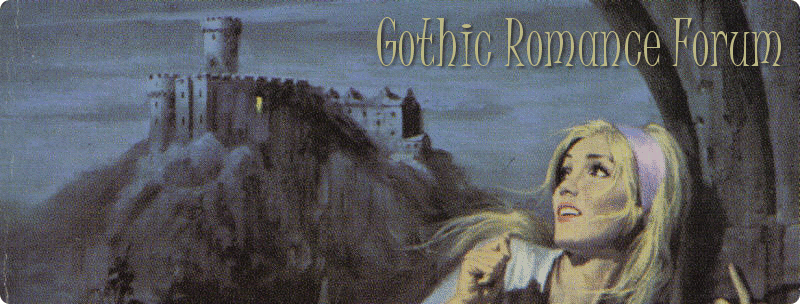Manderley Wrote:I don't care that much for romance, I must admit. In fact I rather prefer it when it's not too much a part of the story. It's all about the gothic atmosphere and settings for me.
Same for me. It's the gothic part that's key. Atmosphere, atmosphere, atmosphere! I don't mind a gothic with romance in it, but romance without the gothic -- or at least high suspense -- isn't my cup of tea.
Nor should the romance become too maudlin or the author indulge in pages of angst-ridden inner monologue. This quickly becomes tiresome. One thing second-rate authors often forget is that we, the readers, know that the heroine and her beloved will get together in the end. What's of interest is
HOW this will happen, not
IF. Too much time spent on the
"if" factor is annoying.
One interesting feature of the gothic / romantic suspense novel is often the presence of several possible suitors for the heroine, but you don't know at first who's good and who's bad and which of them she'll end up with. Anything that keeps up the sense of mystery is good.
The locale or setting of a novel is a matter of make-or-break importance for me. I want to vicariously live through the experience and that means it has to take place in an environment I myself would find appealing in some way, even if it's ominous or sinister in atmosphere. Who wouldn't want to go exploring an ancient castle full of hidden passages or an old manor house on the moors?
Additional elements that will keep me coming back to an author: hints of a ghost or a curse on the house or the dynasty that lives there (especially when there is no conclusive evidence, just eerie suggestion); mysteriously draconian servant characters of the Mrs. Danvers type who may or may not mean well for the heroine; grandfather clocks; tea and coffee; the setting being isolated and possibly inaccessible during the harsh winter months; also inexplicable events that cause the heroine to wonder if she's losing her mind (of course we know she isn't but what
is happening?) . . .
Clichés? Sure! Formula? Certainly -- but then a chess game is a formula, the pieces always laid out on the board in the same fashion and moved according to expected patterns. Everything depends on who's playing the game and, in the case of gothic novels, who's writing the book.
Oh -- and an attractive, modest and intelligent heroine is of course a must. Mary Stewart and Victoria Holt unfailingly provide appealing heroines (IMO) that don't seem dated even now. They're strong but vulnerable.
Another quality I look for in a gothic: a sense of timelessness, that the story doesn't really feel like the present-day real world even if it does take place in it. Sure, the heroine may step off a 747 jet and take a taxi to her destination, but once she gets there, she might as easily be in the 19th century as the present. I prefer when the author doesn't commit to the story being in too specific a time period, so that it's not too rigidly linked to the present. It's all part of the escape.




